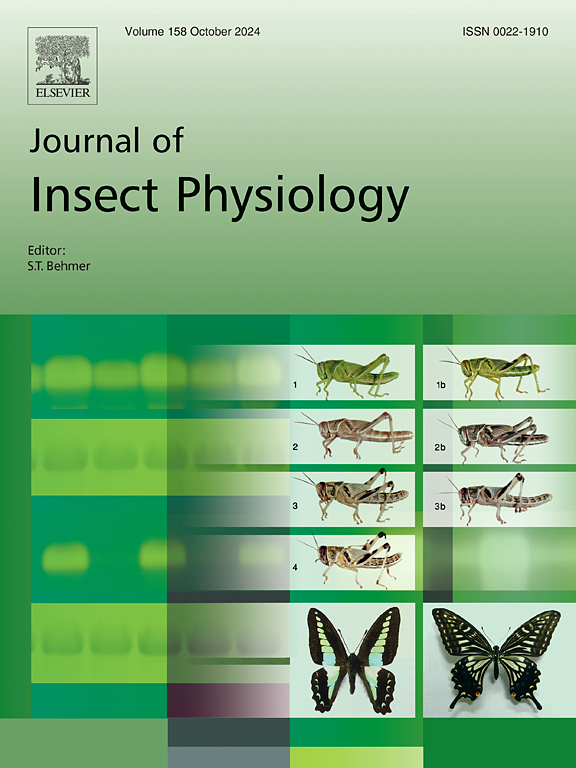杀雄螺浆内共生体对果蝇的耐力和睡眠有年龄介导的影响。
IF 2.3
2区 农林科学
Q1 ENTOMOLOGY
引用次数: 0
摘要
内生细菌对宿主的生理、行为、新陈代谢、耐力和活动能力有广泛的影响。最近的研究发现,一些内生细菌还会影响宿主的睡眠时间和质量。这些影响可能会随着苍蝇年龄的增长和内共生体滴度的增加而加剧。我们测试了一个假设,即螺旋体(Spiroplasma poulsonni MSRO)会对黑腹果蝇的睡眠产生负面影响,进而损害果蝇的耐力。在地轴爬行试验(耐力的代表)中,我们发现 MSRO 会影响爬行耐力,但其影响方式与年龄有关。与未感染的苍蝇相比,在较年轻的苍蝇中,MSRO+苍蝇在黑暗时期的睡眠时间明显较少(通过果蝇活动监测系统测量),但与同组未感染的苍蝇相比,年龄较大的MSRO+苍蝇在睡眠时间上没有明显差异。虽然MSRO状态会影响宿主的睡眠和耐力,但内共生体介导的睡眠剥夺并不能直接解释苍蝇耐力下降的原因。我们将在内生共生体比较生物学的背景下讨论这些结果。本文章由计算机程序翻译,如有差异,请以英文原文为准。

A male-killing Spiroplasma endosymbiont has age-mediated impacts on Drosophila endurance and sleep
Endosymbiotic bacteria have a wide range of impacts on host physiology, behavior, metabolism, endurance, and mobility. Recent work found some endosymbionts also impact host sleep duration and quality. These effects may increase as flies age and endosymbiont titers increase. We tested the hypothesis that Spiroplasma poulsonni MSRO negatively impacts sleep in Drosophila melanogaster, and this in turn impairs fly endurance. In geotaxis climbing assays (a proxy for endurance), we found that MSRO impacted climbing endurance but in an age-dependent manner. Among younger flies, MSRO+ flies slept significantly less during dark periods (measured by a Drosophila Activity Monitoring System) compared to uninfected flies, but older MSRO+ flies did not show significant differences in amount of sleep compared to uninfected flies in the same cohort. While MSRO status impacted both sleep and endurance of hosts, endosymbiont-mediated sleep deprivation did not directly explain decreases in fly endurance. We discuss these results in the context of endosymbiont comparative biology.
求助全文
通过发布文献求助,成功后即可免费获取论文全文。
去求助
来源期刊

Journal of insect physiology
生物-昆虫学
CiteScore
4.50
自引率
4.50%
发文量
77
审稿时长
57 days
期刊介绍:
All aspects of insect physiology are published in this journal which will also accept papers on the physiology of other arthropods, if the referees consider the work to be of general interest. The coverage includes endocrinology (in relation to moulting, reproduction and metabolism), pheromones, neurobiology (cellular, integrative and developmental), physiological pharmacology, nutrition (food selection, digestion and absorption), homeostasis, excretion, reproduction and behaviour. Papers covering functional genomics and molecular approaches to physiological problems will also be included. Communications on structure and applied entomology can be published if the subject matter has an explicit bearing on the physiology of arthropods. Review articles and novel method papers are also welcomed.
 求助内容:
求助内容: 应助结果提醒方式:
应助结果提醒方式:


